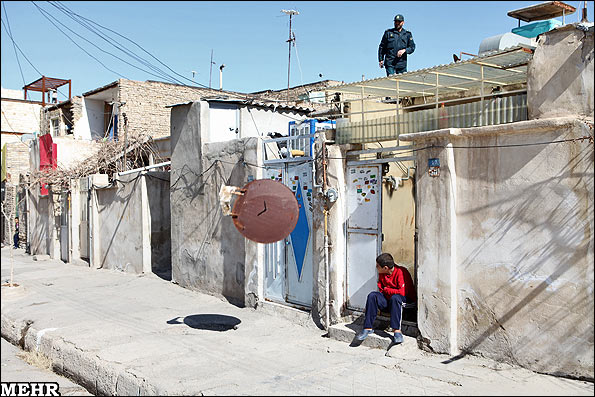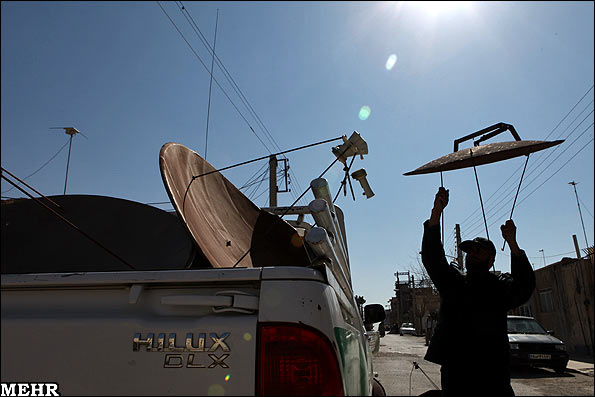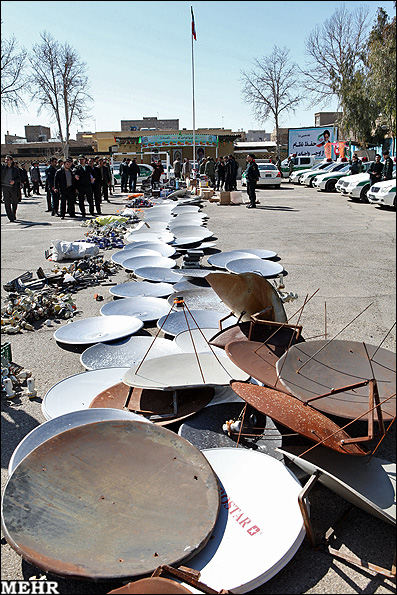Briefing | Satellite Wars: Why Iran Keeps Jamming
by SMALL MEDIA
20 Nov 2012 10:59Comments
From conspiracy theory to political reality, the IRI has multiple motivations to sever signals from the world outside.
 [ briefing ] All television broadcasting in Iran is officially under state control, though Islamic Republic of Iran Broadcasting (IRIB) is generous enough to provide a semblance of choice with eight national television channels, in addition to 30 provincial ones. Still, many Iranians evidently want more. While satellite television is legally prohibited, over a quarter of all Iranians have home access to a satellite dish and more than 32 percent watch satellite television in the average week, according to data compiled by the U.S. Broadcasting Board of Governors. The deputy chief of IRIB itself has said that as many as 40 percent of Iranians watch forbidden satellite programming.
[ briefing ] All television broadcasting in Iran is officially under state control, though Islamic Republic of Iran Broadcasting (IRIB) is generous enough to provide a semblance of choice with eight national television channels, in addition to 30 provincial ones. Still, many Iranians evidently want more. While satellite television is legally prohibited, over a quarter of all Iranians have home access to a satellite dish and more than 32 percent watch satellite television in the average week, according to data compiled by the U.S. Broadcasting Board of Governors. The deputy chief of IRIB itself has said that as many as 40 percent of Iranians watch forbidden satellite programming.
The Iranian government pushes back with the occasional dish raid and, increasingly often, by jamming satellite signals. On Tuesday evening, the London-based nongovernmental organization Small Media will be presenting its new report on this censorious campaign, "Satellite Jamming in Iran: A War Over Airwaves," at the British Houses of Parliament. Small Media describes itself as "an action lab helping the free flow of information and creative expression in closed societies, with training, technology and research initiatives that focus on Iran."
The following passages are excerpted from the report's executive summary, introduction, and chapters that consider the questions "What Is the Importance of Satellite Television in the Islamic Republic of Iran?" and "How Disruptive Is Satellite Jamming For Broadcasters and Audience?" The report elsewhere provides a historical overview of jamming; analyses of the technical, financial, and legal issues involved; jamming's potential health risks; and what the international community and satellite providers have done and can do in response. The complete report, released under a Creative Commons Attribution-NonCommercial-ShareAlike License, is available for download here. -- The Editors
There are at least 120 Persian-language satellite TV channels broadcasting into Iran from the diaspora, incomparable with the use of satellite TV in any other diasporic community in the world. For the Iranian government, these channels are "proof" of the West's engagement in a soft war against their rule. Satellite jamming is a key point of contention, not only between Iran and international broadcasting authorities, but also within Iran's ruling establishment. Although Iranian officials have not assumed responsibility for satellite jamming, this report provides evidence showing that they are, at the very least, complicit in such actions. [...]
Satellite jamming is a form of censorship akin to Internet censorship, whereby the Iranian government prohibits access to and inhibits the free flow of information. Referred to as "intentional interference" in technical literature, satellite jamming is a violation of Article 15 of the Radio Regulations of the International Telecommunications Union.
The jamming of Persian-language satellite channels has been ongoing since 2003. Infrequent bouts of pressure from the international community have achieved limited success. Alongside international organizations like the International Union (ITU), the governments of the United Kingdom, United States, France, and the European Union have condemned the Iranian government for not acting on the issue of satellite jamming. Despite these condemnations, the jamming of satellite TV channels has continued. At the time of publishing, the sudden devaluation of the Iranian rial in October 2012 had spurred another intense period of jamming, with the broadcasts of both BBC and the VOA being disrupted.
As a result of increasing pressure from the international sanctions imposed on Iran, Eutelsat dropped 19 state-owned Iranian channels from its Hotbird satellite in October 2012. Intelsat has reportedly followed suit. These decisions will have a significant impact on the ability of the Iranian government to broadcast its channels internationally. However, it is highly unlikely that these moves will result in the reduction of incidences of jamming; such moves could provoke an increase of jamming in retaliation, which would further isolate the Iranian people.
In a closed society like Iran, where the government maintains a tight grip over the media and all modes of communication, satellite television broadcasts from outside the country carry particular significance for both the authorities and the Iranian public. The Iranian government sees satellite channels as a Western front in the "soft war" being waged against their rule, a "weapon" intent on undermining the country's religious and cultural beliefs. Steven Barraclough writes,
As described by Ayatollah Khamenei, the country's constitutional leader, Iranian broadcasting...is "the mouthpiece of the Islamic system." Its duty is to stand at the 'forefront' against "a well-organized and obvious offensive [which] has been launched by [the] enemies of Islam against divine principles with an aim of promoting secularism, undisciplined behavior and corruption among the people."
 In an interview with the conservative news agency Alef News in 2011, the head of Iran's National Security Forces, Esmaeil Ahmadi Moghadam, reinforced this point with specific reference to Voice of America and the BBC:
In an interview with the conservative news agency Alef News in 2011, the head of Iran's National Security Forces, Esmaeil Ahmadi Moghadam, reinforced this point with specific reference to Voice of America and the BBC:
VOA and the BBC are the intelligence arms of America and the CIA...collaborating with these channels is not just cooperating with a media organization, it is working in cooperation with the intelligence services of the enemy and any cooperation with them will be monitored by the Ministry of Intelligence and the National Security Forces of Iran.
Conversely, many Iranians see these channels as means of entertainment, a place to acquire new information and keep up to date with the world. In a sociopolitical context where all officially sanctioned television is produced by the government and thus keeps in lockstep with their worldview, many Iranian viewers are eager for variety.
In an article for the online magazine The Power of Culture, photojournalist and blogger Kamran Ashtari argued,
People want contact with the outside world, want to hear world news, want to watch films. Not only America's latest hits and French classics, but also uncensored Iranian films. Not only because they are fed up with censorship and propaganda: the state television is really very boring!
This is why, despite tough talk and legislation, satellite dishes continue to proliferate across Iranian cities, urban areas, and villages. Although Iranian officials claim to have attracted the majority of the country's viewers to state TV and radio programs, they also admit that Persian channels broadcasting from abroad have become challenging competition. A recent poll, undertaken by Iran's state media, revealed that 50 percent of the population own satellite dishes and the average household spends 125 minutes a day watching satellite broadcasts. Farid Haerinejad, Radio Zamaneh's editor-in-chief at the time of interview, advised Small Media,
Satellite broadcasting is very important in the Iranian context. The general Iranian audience is still more comfortable receiving information distributed through classic mediums such as TV and radio. The World Wide Web, because of heavy filtering, is largely inaccessible to those who cannot or do not know how to bypass the filtering. Those who can't circumvent the government's censorship are typically middle-aged and elderly Iranians...TV and radio are still very popular and people can access broadcast signals even in remote areas via a satellite dish. When the Iranian government attacks and jams satellite signals, this crucial medium of connection is lost.
[...] Conservative media also regularly deride satellite channels in their reporting, and the police and security forces routinely confiscate satellite dishes from private residences. However, while the situation is notably severe, it is important to keep in mind that the restrictions placed on people in Iran are constantly in flux depending on the political situation. In May 2010, less than a year after the disputed presidential elections and the resultant establishment of the Green Movement, Mohammad Esmaeil Kowsari, a member of the parliament's National Security Commission, publicly praised the act of satellite jamming, as he considered it a representation of the power and capability of the Iranian state:
Satellite [technology], by its very nature, is a great tool for communication, but only if it is utilized with an appropriate aim and for collecting information. If the "master of all satellite channels" uses satellite to destroy other nations, promote immorality in societies, and feed the youth of a nation with information that makes them forget their identity and roots, I have to confess that satellite's disadvantages are more than its advantages.... We should not look at satellite jamming as a negative phenomenon. In my belief, jamming is a power in our hands.... We do not have any problem with the scientific shows, but if a satellite channel increases insecurity within Iran, then we will use all our power, including the use of satellite jamming, to stop such channels from making our youngsters immoral.
In contrast, at the Expediency Discernment Council's conference "Reviewing and Revealing the Hidden Targets of Persian Satellite Channels," on May 24, 2010, Sadegh Ziba Kalam posited that the governmental problem with Persian-language satellite channels is a semantic one:
The problem originates from the word "enemy," which is what we call satellite channels such as BBC and VOA. This mentality comes from a historical, ideological and political opinion rooted in conspiracy theory. We have to ask ourselves, are the BBC or VOA really affecting events or are they actually reporting the real happenings in Iran.... Looking only at the political effects of these satellite channels stops us from seeing their social and cultural importance. This is why Seda va Sima [IRIB] is less successful in attracting viewers than these satellite channels.
Entertainment network Manoto agreed to post a specific question about jamming to their Internet forum, which has more than 130,000 registered users, in order to help us gauge how viewers feel when it occurs. Fifty-four forum users responded via their website. In addition, on May 3, 2011, BBC Persian published a brief comment about the banning of satellite dishes in Iran, asking for feedback. Below is a selection of comments from these two forums, which illustrate the frustrations caused by satellite jamming and show the large amount of speculation about why, how and at the hands of whom jamming is occurring.
 One Manoto viewer, based in central Tehran and going by the handle Arian 1984, hypothesized as to why some channels get jammed and others remain untouched:
One Manoto viewer, based in central Tehran and going by the handle Arian 1984, hypothesized as to why some channels get jammed and others remain untouched:
I don't think it's important whether the channel is showing a political show. What matters is whether or not these satellite channels talk about the Supreme Leader. This is the red line. When debates about the Supreme Leader are shown on a satellite channel, that is when the jamming begins. This is the consequence of our own mistakes, and, apparently, the price we must pay for attaining democracy.
Viewer Irani -- from Saari, the largest city in Mazandaran province -- thought Manoto was being jammed because of the Ninth Majles election (March 2012), and hoped that a "normal" service would resume afterwards:
We experienced jamming a few days before the parliamentary election on all three satellites, and thought that this was due to the election and would end afterwards. However, we are still experiencing satellite jamming even though the election is over. It is now during prime time TV (10pm onwards) when the jamming occurs, and it is worse in central Saari than in the suburbs.
In response to a question about specific shows it was thought triggered jamming, Fable God Father replied, "These days, I experience jamming mostly when news or political shows are on. I think whoever is doing this jamming is afraid of people freely obtaining information and knowledge. I have no feelings anymore; I am numb."
Some viewers expressed feelings of desperation, and posited ways that broadcasters could avoid being jammed, going so far as to recommend that broadcasters air pro-government shows. For example, K1.gh said, "If you show 2 or 3 programmes in favour of the regime during the day, then the problem of jamming will be solved."
With regards to private ownership of satellite dishes, viewer Azadey, who claimed to be a satellite installer, highlighted the hypocrisy of confiscating satellite equipment:
Whatever they [the government] say is harmful to the society appears to not be harmful for them and their families. They all have satellite dishes in their houses, yet they think it is not appropriate for people to have this equipment...without satellite dishes, the situation would be disastrous for the people of Iran.
Other viewers expressed anger towards the government, and thought that the continuation of these practices was only fueling this anger amongst the Iranian people. Soheila T stated, "All these attempts by the authorities to restrict broadcasting will only add to the hatred people have towards the regime; it will actually contribute to their overthrow."
[...] Shervin.mm, for example, said, "It is not believable that the IR will let information circulate freely and openly. If they did so, then a lot of information about their corruption would be unearthed." Yaar Dabestani agreed with Shervin.mm, echoing the sentiments of Soheila T:
There are many international regulations upon which the Iranian government is obliged to act, but, in reality, they do not act according [to their international obligations]. All of this censoring and jamming is because the regime is afraid. There is no way the Islamic Republic will allow any small opportunity for freedom of information in Iran! The regime's only supporters are those who are fanatical and praise the dictatorship. The regime knows that if they allow society to open up, it will eventually lead to their overthrow.






























In order to foster a civil and literate discussion that respects all participants, FRONTLINE has the following guidelines for commentary. By submitting comments here, you are consenting to these rules:
Readers' comments that include profanity, obscenity, personal attacks, harassment, or are defamatory, sexist, racist, violate a third party's right to privacy, or are otherwise inappropriate, will be removed. Entries that are unsigned or are "signed" by someone other than the actual author will be removed. We reserve the right to not post comments that are more than 400 words. We will take steps to block users who repeatedly violate our commenting rules, terms of use, or privacy policies. You are fully responsible for your comments.